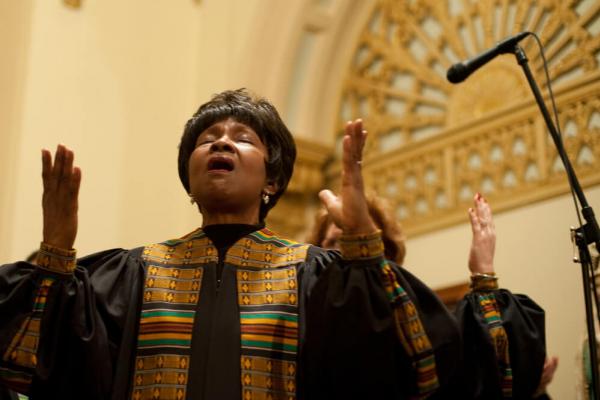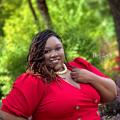As theologian M. Shawn Copeland writes in Enfleshing Freedom, for too long churches have allowed anti-Black and patriarchal ideologies to shape beliefs around who is fit for ministry and who is not. Black women have been historically marginalized both in the church and society — and this trend continues today in theological education as well as the church. Neither the church nor the world of theology will survive if things continue in this direction.
Thankfully, more and more, Black women in ministry and the theological world are reimagining their collective power in their communities, congregations, schools, and institutions.
This leads me to a question I’ve been asking myself lately: What happens now that more Black women are publicly saying that they want to put their health, happiness, family, and community above the expectations that society places on them? How might this apply to the church? I’ve been in ministry for almost a decade and often wonder why we continue to accept patriarchal attitudes and behaviors in our society — but especially in the Black church. I spoke with a few of my sisters in ministry about the joys and challenges they have faced both in the ministerial and theological world. This led me to put together a list of three myths and three facts oriented around Black women’s experience in the church and the world of theology.
But first, an important note: There is not a single definition that can capture “the Black church” or Blackness; my use of “Black church” in this article refers to religious institutions where a majority of the membership is made up of Black parishioners. Similarly, I could never represent all Black women in ministry or in the world of theological education. There are many points of intersection and divergence as every person is unique. Through speaking with friends and mentors, reflecting on the work of womanist scholars, and digging into my own experience — or what womanist and Black women scholars call epistemological privilege. I hope the following insights invite you to tell your own story while also providing you with a resource for future use.
MYTH: Black, educated women are fairly compensated for their ministry.
Black women’s labor has been stolen and made invisible within the church. In The Labor of Faith, Africana studies professor Judith Casselberry shows how Black women in the church are unequally paid. The belief that Black women should work for little to nothing in the church is exploitative and directly contradicts Christ’s teaching that people should be paid for their work (Matthew 20:1-16). Withholding fair compensation because of a person’s race and/or gender impacts both society and the church. Rev. Lauren Harris, an ordained elder in the AME church with almost 20 years of ministerial experience, says it this way: “It is extremely frustrating at times as a Black woman in ministry. It doesn’t matter that I have spent years running the senior pastor’s office, ghostwriting for them, and outlining their sermons. When it’s time for a significant promotion or leadership position, I feel overlooked and undervalued. I want the opportunities and salary to match what I bring to the table.”
MYTH: Black women and Black men in ministry are treated equally.
Rev. Ratona Stokes-Robinson had been locked out of St. James African Methodist Episcopal Church for four months because of what she and her supporters identified as a gender bias within the congregation. On Oct. 31, Stokes-Robinson finally preached from St. James AME Church pulpit — but this came only after outcry from advocates and organizers. For a Black woman to be barred from leading a church in an official capacity demonstrates that the gender gap continues to persist in the Black church. In February, the Pew Research Center published a study on faith among Black Americans and concluded that while “opposing sexism is essential to the majority of Black Americans’ faith or sense of morality, only about three-in-ten of those who attend religious services at least a few times a year (28%) say they heard a sermon, lecture or group discussion about that topic.” Considering these findings, it is no surprise that sexism continues to impact the Black church.
That this gap continues to exist in an institution that has claimed to be committed to liberation throughout U.S. history is both discouraging and telling. In a Berkely Forum article, Nicole Myles Turner asks an important question that helps us interrogate why gendered thinking persists in the Black church: “What if we inverted our explorations to consider not just when breakthroughs happened, but how spaces became gendered in the first place and thus created the need for those breakthroughs? If we did so, we’d recognize that the racial limitations of gendered roles set the stage for debates within Black churches and that the politics of Black churches have long been gendered from within as much as they have been constructed from without.” In other words, if we do not invert our exploration of gendered thinking and begin asking how it is that the Black church came to internalize gendered logic, then the vicious cycle of sexism will continue.
MYTH: Black women can’t preach.
After I presented a paper focused on Black, millennial women and their relationship to the Black church, a Black male colleague said to me, “I don’t understand why Black women try to preach like Black men.” On the one hand, I think his response exposed an ironic truth: Acceptance and elevation in the church for some means mimicking the language and actions of men. But whatever truth there was in his response was overshadowed by how the question came off: patriarchal and ignorant.
For centuries men have taken ideas from women without giving them credit — including Black men who have taken sermon ideas from Black women. For example, many people remain unaware of the legacy of Rev. Prathia Hall, who inspired Rev. Martin Luther King Jr.’s “I Have a Dream” speech. From Sojourner Truth to Fannie Lou Hamer, Black women have preached from pulpits, kitchen tables, and the halls of Congress, and no men had anything to do with that. To say that Black women preach like Black men only shows how little is known about the contribution Black women have made to Black preaching.
TRUTH: Black women have played a vital role in the church.
People often forget the contributions that Black women have made to the church. In her groundbreaking book, “If It Wasn’t for the Women,” sociologist Cheryl Townsend Gilkes reminds us that Black women have invested considerable amounts of time, energy, and economic resources in the growth and development of religious organizations. One example Gilkes offers is the Church of God in Christ (COGIC). “Despite its sexism,” says Gilkes, “the church became the structural paradigm for other denominations. Despite or because of women’s exclusion from pulpits, the most powerful Women’s department arose within the Church of God in Christ.” Black women have been expected to maintain social positions that help men feel secure, which perpetuates harmful practices based on race and gender. Perpetuating these practices ultimately perpetuates the way white supremacy subordinates marginalized groups.
TRUTH: Black women are pursuing theological education.
The Association of Theological Schools reports that in 2020 a total of 5,068 Black men enrolled in seminary with 4,412 Black women enrolling as well. This is significant because when compared to other racial groups, Black men and Black women enroll in seminary at comparable rates — this is unique compared to their racial counterparts. Many Black women are pursuing theological education or ordination despite the barriers. Far from allowing their theological education to pigeonhole them into traditional church positions or teaching positions, Black women are using their education to pursue advocacy, education, or the arts.
The theological world should follow the example of theologian Yolanda Pierce. She is less concerned with fitting womanist perspectives into traditional theological formulations, and more concerned with the practical ways Black women are making sense of their experiences and highlighting places they see God working in the world. This is what Pierce refers to as “everyday womanist theology” which focuses on helping Black women thrive in a world that is often opposed to them based on their gender and race.
TRUTH: Ministry for Black women goes far beyond the institution of the church.
In her book Too Heavy A Yoke, Chanequa Walker-Barnes, a professor of practical theology and pastoral care at Columbia Theological Seminary, writes that many “strongblackwomen” have carried their crosses — and the crosses of others — for so long without support. These actions have the tendency to lead to burnout and life-altering health conditions. She states many have “developed an extraordinary capacity for ‘walking with broken feet,’ often unaware [they’re] in pain.” For some, this has resulted in leaving “traditional” expressions of Christianity to pursue pathways to African religious practices which emphasize self-care and creating non-judgemental spaces. This ancestral avenue provides an outlet for women who are looking for alternate routes to freedom. It’s time for Black women to pursue more of these options in an effort to create and find spaces where they are seen and affirmed.
Reflecting on the legacy of womanist theology, ethicist Emilie M. Townes said, “Black women in America are morally bound to be justice-seeking whole human beings even in the face of being told, sometimes relentlessly so, that we are less than whole, that we are less than human. Don’t believe that lie.” I hope my fellow Black sisters, colleagues, friends, and strangers resist the myths and lean into the truths to support Black women in ministry and the theological world. If we want to actually experience a new world, we must find new ways to be, then spread the word, and then finally plot out the road to freedom so that no one is left behind. Black women are paving the way.
Got something to say about what you're reading? We value your feedback!





